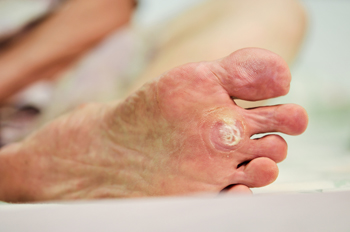
Warts are caused by a virus. When they develop on the soles of the feet, they may are termed plantar warts. They grow inward as a result of the weight the feet must bear, and can cause severe pain and discomfort. Warts are contagious and are caused by the human papillomavirus, abbreviated as HPV. This virus lives in warm and moist environments, and it can be transmitted between people by sharing shoes, towels, or socks. It is beneficial to wear appropriate shoes while in areas such as public swimming pools, shower room floors, and similar places. Many people choose to wear flip flops or water shoes, and it is helpful to refrain from walking barefoot. A plantar wart is a hard, thick patch of skin, and it often has dark spots in the center. They can cause difficulty in walking, and many patients may alter their gait, which may help to reduce existing pain. If you have a wart on the bottom of your foot, it is suggested that you consult with a podiatrist who can offer you one of various treatments for plantar warts.
Plantar warts can be very uncomfortable. If you need your feet checked, contact Kimberly Woodard, DPM from Pinnacle Foot and Ankle Centers, LLC . Our doctor will assist you with all of your foot and ankle needs.
About Plantar Warts
Plantar warts are the result of HPV, or human papillomavirus, getting into open wounds on the feet. They are mostly found on the heels or balls of the feet.
While plantar warts are generally harmless, those experiencing excessive pain or those suffering from diabetes or a compromised immune system require immediate medical care. Plantar warts are easily diagnosed, usually through scraping off a bit of rough skin or by getting a biopsy.
Symptoms
- Lesions on the bottom of your feet, usually rough and grainy
- Hard or thick callused spots
- Wart seeds, which are small clotted blood vessels that look like little black spots
- Pain, discomfort, or tenderness of your feet when walking or standing
Treatment
- Freezing
- Electric tool removal
- Laser Treatment
- Topical Creams (prescription only)
- Over-the-counter medications
To help prevent developing plantar warts, avoid walking barefoot over abrasive surfaces that can cause cuts or wounds for HPV to get into. Avoiding direct contact with other warts, as well as not picking or rubbing existing warts, can help prevent the further spread of plantar warts. However, if you think you have developed plantar warts, speak to your podiatrist. He or she can diagnose the warts on your feet and recommend the appropriate treatment options.
If you have any questions please feel free to contact our office located in Port St. Lucie, FL . We offer the newest diagnostic and treatment technologies for all your foot and ankle needs.
